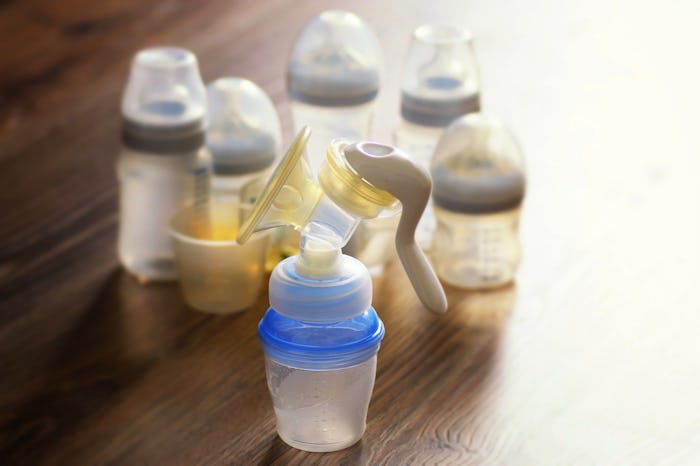There are few things worse than panicking about breastfeeding, especially when you hear so many breastfeeding supply myths. I can't tell you how many people told me while I was pregnant that I was either going to have an easy time breastfeeding ("You already have big boobs, you probably won't have an issue") or that there was a good chance I was going to have a low milk supply. ("Most people do, you know, so you should start taking herbs now.")
But all these myths do is perpetuate the fear that moms aren't able to breastfeed or that they are going to have serious difficulties when they try. In turn, those myths could be to blame for why so many women give up breastfeeding. According to the Centers for Disease Control and Prevention, the amount of breastfed babies at birth drops to nearly half by the time the baby reaches 6 months old. By a year old, the number has slashed in half again with only 22.7 percent of babies still being breastfed at their first birthday.
Whether it's because of a lack of support from employers, family members, and healthcare professionals or because they have been swayed by falsities concerning breastfeeding, it's important to know the truth behind these nine breastfeeding supply myths. Use them to educate yourself and to offer support to those around you who may be struggling or worried about their supply.
Myth #1: If Your Baby Nurses Too Much, They'll Drain Your Supply
Despite what you may have been told, your breasts are not actual jugs and your baby can't decrease your supply by nursing too much. (Pumping too much won't rid your breasts of milk either.) In fact, the opposite is true. According to Psychology Today, breastfeeding on demand guarantees that you won't run out of milk. The more you nurse, the more milk your body produces to keep up with your baby's demands.
Myth #2: Soft Breasts Mean Your Supply Has Decreased
I touched my breasts more in those first few weeks of breastfeeding than I had in my entire life — they were huge, hard, and literally leaking milk all over the place. A lot of moms can relate to that feeling, but the myth that soft breasts mean your supply has decreased are absolutely untrue. KellyMom noted that as your milk supply regulates, your breasts may feel less full and heavy, but it doesn't mean you aren't making enough milk. It just means that your breasts have adjusted to your baby's needs and they are no longer making too much milk but exactly how much your baby needs.
Myth #3: Your Milk Supply Is Related To Your Breast Size
Size doesn't matter when it comes to milk supply, ladies. According to Fit Pregnancy, fat tissue is what gives your breasts their size, but that's not the tissue responsible for breastmilk as it doesn't have milk ducts. It really doesn't matter if you can go without a bra or feel like you need two some days — your breasts can make milk regardless of their size.
Myth #4: You'll Most Likely Have Supply Issues
I was worried that I wouldn't be able to breastfeed my daughter. Maybe because there are so many myths about breast milk supply? It's common to hear that someone couldn't breastfeed or had serious supply issues. Many are real problems, but in general, supply and demand is all you need to have adequate milk supply according to KellyMom. If you nurse your baby on demand, your body will produce enough milk — it's not a complicated design.
Myth #5: You Have To Drink Milk To Make Milk
This is an old wives' tale, but it's one that needs to be banished, especially for moms who are dairy-free or can't stomach the thought of a glass of milk every day. According to Baby Center, while you need adequate hydration for a healthy milk supply, you don't have to drink milk to make breast milk. There's no harm in it, but there's no evidence that suggests milk can help your production and supply.
Myth #6: Poor Pumping Output Means Your Milk Is Decreasing
Many moms worry that if they aren't pumping much, then they don't have enough milk for their baby. Not true. The Leaky Boob noted that your baby is much more efficient at removing milk from your breast than a pump, so it's not fair to judge your supply on the pumping output.
Myth #7: If Your Baby Is Nursing More Often, It's Because Your Breasts Aren't Producing Enough Milk For Them
Not true. There are so many reasons why your baby could be breastfeeding for longer, more often, or why they seem fussy after feeding. But KellyMom noted that it doesn't mean your breasts aren't producing enough milk for them or maintaining an adequate supply. As long as your baby's weight is fine and their wet and dirty diaper count is good, your breasts are producing plenty.
Myth #8: Certain Foods & Herbs Can Increase Your Supply
You've probably been told to eat certain foods or herbs if you want an increase in milk production, but there's not much research to back up those claims according to Oasis Lactation Services. On the same topic, certain foods and herbs have not been backed by evidence to prove that they can decrease your milk supply either.
Myth #9: Your Supply Will Disappear If You're Pregnant
KellyMom noted that your milk supply could decrease if you're pregnant, but it won't just disappear. In fact, your regulated milk supply should hold up for the most part, you may just notice a decrease in the amount of milk your breasts are producing.
